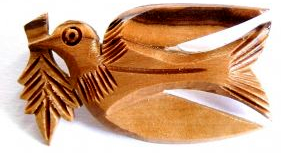
Beit Sahur Journal; In a Tax War, Even the Olivewood Dove Is Seized
To press the Palestinian uprising, the people of this town have refused for months to pay their taxes. In response, Israel has begun to confiscate their goods. The raids, Aysa Hanna Khier says, have produced some incongruities.
The Christian crosses carved of olivewood and the statuettes of the Good Shepherd and the Madonna may have seemed improbable commodities, but Mr. Khier said the tax collectors and soldiers seized them when they raided his woodcarving workshop here on .
Even the small fretwork wall-plaques showing a dove on the wing over the Hebrew word Shalom were taken in lieu of the withheld taxes, he said.
Mr. Khier is among some 60 Palestinians from this prosperous and predominantly Christian Arab town near Bethlehem to have felt Israel’s response to what Palestinians depict as a new tactic of the uprising in the occupied West Bank and Gaza Strip, now 22 months old.
Campaign of Disobedience
Beit Sahur has been elevated by the militants to a symbol of what they hope will be a new phase of civil disobedience to confound 22 years of Israeli occupation, bring scorn on Israel’s tactics and persuade the Israelis that, even in a middle-class and cozy town like this, loyalty lies elsewhere.
Israel’s response is designed to negate those arguments in the near-constant test of wills that has underpinned the uprising from its beginnings in . And so the battle, accompanied by curfews and roadblocks and armed patrols through the streets, has spawned a litany of losses in this town of 13,000 whose pale stone walls cling to the bleached hills of Biblical lands. [Defense Minister Yitzhak Rabin said that Israel would teach a lesson to Palestinians who refused to pay taxes in Beit Sahur, Reuters reported. Participants at a closed-door parliamentary committee meeting said Mr. Rabin told them: “There will not be any attempt to boycott taxes. If it takes a month, it will take a month but they will break. We are going to teach them a lesson.”] Michel Kokaly, an auto mechanic, said he had forfeited hoists from his workshop and the sofas, chairs, tables and television from his spacious apartment above the shop when the soldiers and tax-collectors arrived a week ago. What pained most, said his wife, Ibtisam, was that the children, 6 and 9 years old, did not recognize their empty home when they came home from school at noon. A third child, who is 3, threw a pebble at the soldiers and called them names, she said with some pride, as if that tempered the loss.
In the office of Mayor Hanna Atrash in Beit Sahur, other men have their stories, too. Issam Sheheibet, a wealthy merchant, says the collectors took flour, sugar, barley and refrigerators from his stores.
Counting the Losses
Selim Qassis, a carpenter, estimates he has lost machinery worth $35,000. Yassa Abu Zelef says he lost his television set, VCR and hi-fi, even though he closed his shop six months after the uprising began. “I have no money to pay,” he said.
“Nobody is paying now,” said Mayor Atrash, alluding to the ending of a previous exemption of some big factories from the tax protest.
“This is going to mean that all factories, all workshops, all shops are heading for a shutdown,” Mr. Atrash said. “It is beyond my imagination what will happen next.”
In interviews, many men said they would not pay taxes because they did not wish to finance their own occupation and, anyway, saw no benefit from the money they had already paid. Before the uprising, Mr. Khier, the woodcarver, said, he had been paying around $4,000 a year in taxes. Mr. Kokaly, the mechanic, said his taxes had been around $2,700 a year, counting income tax and value-added tax.
Auction Is Coming
Both men said they would not attend the auction the Israeli authorities plan next week in Tel Aviv to dispose of goods seized in Beit Sahur.
The confiscations mean that even if they wanted to pay taxes, some are no longer able to earn money to do so.
According to Israeli officials, the taxes Palestinians pay in the occupied territories are used for the maintenance of health services, schools and transportation. The military body that oversees the occupation, called the Civil Administration, employs 13,000 salaried Palestinians, the officials said.
“We have nothing against Beit Sahur,” one official said, asking not to be identified by name, “but it is the only town where people are not paying taxes.” He said the number of those refusing to pay was between 250 and 300. About $1 million worth of property has been seized so far, the official said, and the tax collection effort will continue.
Won’t Bankroll the Occupation
“I paid before the intifada,” Mr. Kokaly said, using the Arabic term for the uprising. “But because of the intifada I am not paying. I will not finance occupation.”
Some people here say that because Beit Sahur is home to so many educated and professional people, those whose property has been seized will still be able to lean for support on family members, defying the Israeli effort to subdue them.
Mr. Kokaly, thus, walked forlornly around his empty apartment, pointing out where the sofas and chairs and table and television had been, noting wryly that the authorities had at least left them their beds to sleep on and their stove to cook on. Then, to continue the talk, he took a visitor to his brother’s identical apartment, one floor down, that had not been raided, to discuss the matter further over coffee.
But the leaders of the uprising would have the tax protest viewed in a loftier light. Their slogan: “No taxation without representation.”
